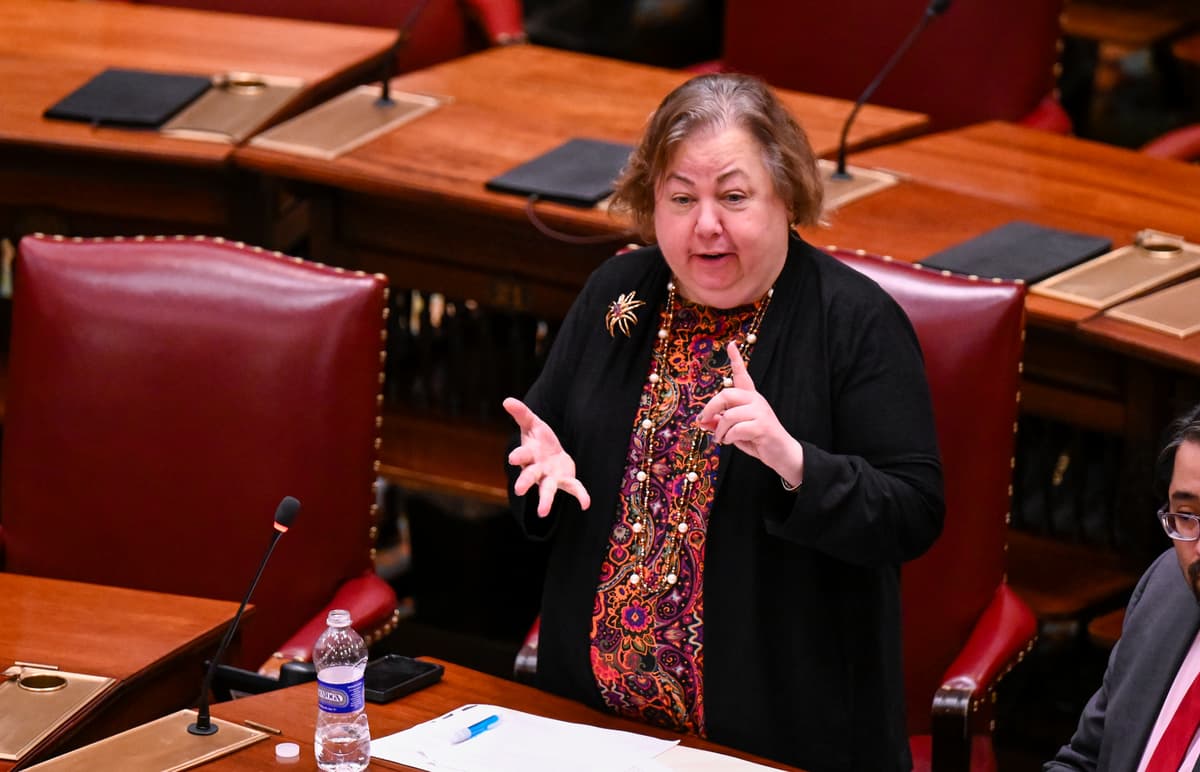How a Group of Secessionists From New England Concluded It Was Better To Bow to the Constitution
Senator Krueger of New York drums up support among neighboring states to secede from the Union over President Trump’s victory.

A Democrat in New York’s legislature, Senator Elizabeth Krueger, is drumming up support at Albany and neighboring states to secede over President Trump’s victory. The obvious parallel is the Civil War, but, in this columnist’s reckoning, the New England secessionists in the War of 1812 offer a wiser, less bloody example.
Even before Trump’s election victory, Ms. Krueger began imagining the dangers he’d pose to New York and New England. Like the Democrats of the Confederacy, who couldn’t abide the election of another Republican, President Lincoln, she had an extreme exit plan ready when he won.
Unlike the confederacy, Ms. Krueger doesn’t seek an independent sovereignty. Instead, she told the City & State New York website in September that Canada “should instead agree* to let us be the southeast province, a new province” to include New York, Connecticut, Massachusetts, and Vermont.
“It’s not unreasonable,” Ms. Krueger muses to Politico last week, “to think outside of the box.” It is, however, unreasonable to think outside of the union, which the nation’s bloodiest war — at a cost of 600,000 lives — settled 150 years ago.
After Trump’s amiable meeting over the weekend with Prime Minister Trudeau, it’s hard to imagine that Ottawa would welcome breakaway states, anyway. That’s even if the Constitution did provide a mechanism for tearing a star off Old Glory.
On the contrary, Trump joked with Mr. Trudeau about welcoming what Winston Churchill called “the Great Dominion” as the 51st United state. The president-elect illustrated the bit with an image of him gazing across snow-covered mountains against a Maple Leaf flag with the message, “Oh Canada.”
Canada and America last fought in the War of 1812, when the frozen north was ruled by the United Kingdom. Often called the Second American Revolution because it cemented independence, America sacked the Canadian capital at York. British forces retaliated in 1814 by invading the District of Columbia and burning the White House.
The offensive forced President Madison to flee, and his support plummeted as the enemy Britons rampaged unchecked by federal defenders. Madison’s opponents in the Federalist Party — with New England their stronghold — met in secret to consider solutions.
The war was wreaking havoc on New England’s economy, and Madison was calling up their militias to fight. Plus, also, too, President Jefferson’s embargoes against Britain had hit the region hard and his purchase of the vast Louisiana meant Federalists would have diminishing say in Washington.
Delegates from Rhode Island, Vermont, and New Hampshire met with those from Connecticut at their capital, Hartford, to discuss paths forward. The governor of Massachusetts, Caleb Strong, offered Great Britain a secret deal: A chunk of Maine — not yet a state — if they’d end the war.
Meanwhile, Senator Pickering — another Massachusettsan who served as secretary of state to Presidents Washington and John Adams — rallied the secessionists. He envisioned a separate nation including New England, New York, and some Canadian territory.
It had been just 36 years since America declared its independence in 1776; the idea of doing so again didn’t seem as far-fetched as Ms. Krueger’s does today. While she trumpets her plans, though, the delegates two centuries ago knew they were dabbling in treason and kept no record of their discussions.
Another Massachusetts delegate, Senator Harrison Gray Otis, guided the loyalists to victory. He crafted a statement outlining the injuries New England was suffering, rejecting secession but acknowledging that it might cure “multiplied abuses of bad administrations.”
The Hartford Convention, after voting down a breakup, began to work within the Constitution for the good of their citizens. They drafted amendments to ensure that even as America expanded, they’d be protected.
Among the changes, the Convention sought to rein in the power of slave states by abolishing the three-fifths representation of those held in bondage. They also wanted to exclude naturalized citizens from federal office and require a supermajority to declare war.
None of the proposals got far. The War of 1812 ended, and the New England states settled in as members of a growing union. They accepted that the Constitution gave them certain powers while reserving others to the federal government or to the people.
While Ms. Krueger garners attention for raising the specter of secession, she has also floated measures short of that to register her opposition to Trump. As the chairwoman of the New York’s Senate Finance Committee, she suggested withholding what the state sends Washington in taxes.
That idea is no more likely to succeed than the Hartford amendments. It’s evidence, though, that the legacy of that meeting endures. The delegates were called traitors in their day, but their eventual decision to bow to the Constitution did a service to America and provided an example for us to follow in times of Trump.
_________
* The Constitution, in Article I, Section 10, forbids a state making an agreement with a foreign power (or even another state). The prohibition reads: “No State shall, without the Consent of Congress, lay any Duty of Tonnage, keep Troops, or Ships of War in time of Peace, enter into any Agreement or Compact with another State, or with a foreign Power, or engage in War, unless actually invaded, or in such imminent Danger as will not admit of delay.”

